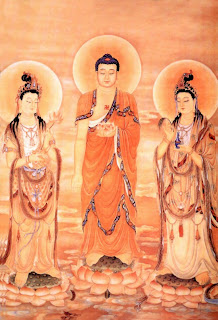My guru, His Holiness Living Buddha Lian Sheng, Lu Sheng Yen 师尊莲生活佛 卢胜彦
I have a classmate in Uni, asking me about the ways of Vajrayana, aka Tibeten Buddhism or Diamond path 金刚乘. He read a book about it and was fascinated by the magical or spiritual aspect of it. He talks about the mantra, the mudra (hand sign) and how some of the practise can improve a person's resources with great interest. His main interest was romance. He asked if I know any mantra that can make a girl fall in love with him. Given the the depth of his words, I knew that he have no basic in Buddhism, also he have trouble relating to people and making people comfortable in a conversation. So I taught him the basic of Buddhism on self-less giving. He wasn't the least bit interested in basic.
Note: some books available today is mainly for cultivator/practitioner so the teachings will not be included, just the methods to practise.
I explained to him that spiritual aid is like the blowing wind for a boat.. To receive the aid of the wind, first you must have a sail, so when the wind blows, it could help moving the boat, and definitely, if you row, the boat will travel faster.
He did not understand that. All he cared was getting the result, getting the girl. He seemed to be blindly following, or have the intention to practise without the basic which can be dangerous. Just like anything else in life, blindly following something and without basic, can be bad. It was not my intention to humiliate but I wish with the repeated message, he will gets it.
I remember few months ago, I signed up for Japanese language class. It was a night the class just ended, I was walking with a classmate to the train station. On our way, I saw another classmate, she was in front of us, walking alone going to the same direction. So I hurried my steps towards her and I lightly pull her bag that was on her shoulder and say the word "DOROBO!" (equivalent of theif/robber in Japanese.) She was frightened, and looking at her reaction, I laughed out loud. She slapped my shoulder. Once we calm down, all 3 of us continue walking. Prior to that, me and her never talked and only exchange eye contacts in class.
PS: Guys, I'm not responsible if you tried this and get negative result
Before living my current quiet boring life, unknown to many, I was a very sociable person and I've talked to all shape and size. Today I often find it a challenge to talk to acquaintances, but with friends that I'm already familiar with, I'm fine. What I wanted to say is, I knew what I was doing and with my experience, I knew she could take it. Instead of doing all sorts of spiritual practise to ask for the Buddha's help to fix interpersonal relationship all the time, it is much more efficient to do the basic in relationship, saying hi, giving sincere smiles.
Allow me to translate contents from a
chapter among hundreds of books written by my guru.
What is Buddhism, If you look at the external appearance, you will find answers like these.
-Worshipping using incense.
-Doing charity work
-Being vegetarian
-Meditation
-Monk and nuns.
and so on and so forth. All of the mentioned is correct, but does not represent Buddhism as a whole.
There are many schools of Buddhism, each with different practise and ways of cultivating the heart. I know it is common for people to want to differentiate, as I progress in my journey, I find it a waste of time for differentiation It is the heart that is important.
It is like saying I love you in different language. The meaning is the same, it is how sincere the speaker express it and if the receiver of the message understand it. In the end, all ways of different method in Buddhism ultimately lead to the same goals. One of the process to going towards the end goal, is purifying the mind, body and speech. That is why while given the precept of refrain from killing, I kill everyday. By accident, I've stepped on snails and ants, when I turn on the lights, there are insects charge forward to the warmth and kill itself. I also killed mosquito intentionally, sometimes I chant the Buddha's name while I do it, sometimes I don't. There's a saying, if the heart is pure, the action is pure.
I once mentioned this in my religion class. "The idols or statues of Buddha is fake, in the end, we can throw it away." A Buddhist's altar serve as a direction. A place to to remind the cultivator to cultivate purity of body, mind and speech. Often a practise start with a form, and move towards formless. The Buddha, is actually everywhere, not just presence in the altar or temple. If one day, I am enlightened, I would throw away my altar. Well not really throw, I'll give it away.
I start to see Buddhism, or religion and arts, have layers. It is not easy to talk about the subject without practise, let alone reading a book, or listening to a master's discourse. As I continue writing this, I find it more and more challenging to write in a manner that is understandable and relate-able to everyone, Instead of giving a summary and then putting a full stop. I'm much more interested to show a side that, ideally answers the question about Buddhism. To know more as a whole, I believe it is your journey, all I can do, is not teach, but guide.
Om Guru Lian Sheng Siddhi Hum (Living Buddha Lian Sheng's mantra. 莲生活佛心咒)
_/\_
Lotus Li Hong

